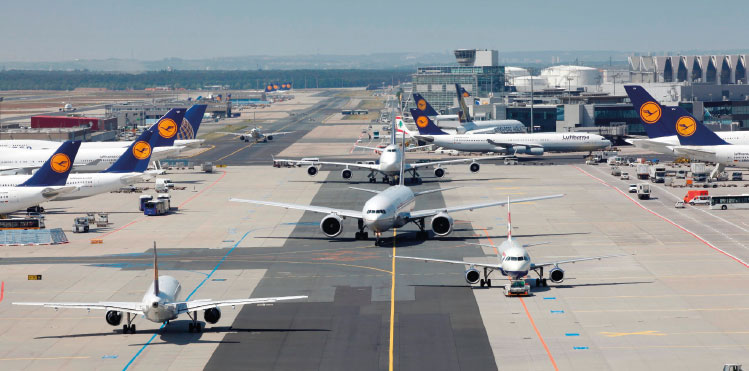
No other airport in Europe has the diversity of routes and destinations that can be reached from Frankfurt. “German jobs depend to a great extent on the exporting industries, and these in turn rely on good connections to the rest of the world. These are concrete competitive advantages that secure our prosperity here in Germany,” said Dr Stefan Schulte, CEO and Chairman of the Executive Board of Fraport AG.
Over centuries, Frankfurt has developed as one of the world’s most important strategic regions for transportation and trade. Located in the heart of Germany and Europe, it is a city that epitomises ‘connectivity’ – with intermodal transportation networks, international trade and communications and digital connectivity all vital parts of its DNA. Frankfurt is Germany’s gateway to the world – and its airport provides the global connectivity that is crucial for a country which depends on its export-driven economy.
No other airport in Europe has the diversity of routes and destinations that can be reached from Frankfurt. “German jobs depend to a great extent on the exporting industries, and these in turn rely on good connections to the rest of the world. These are concrete competitive advantages that secure our prosperity here in Germany,” said Dr Stefan Schulte, CEO and Chairman of the Executive Board of Fraport AG.
The forerunner of Fraport AG was founded 90 years ago, and now the industry pioneer is Germany’s largest work complex at a single location – employing some 78,000 people and representing a diverse array of nationalities, occupations and career opportunities. The Frankfurt region depends on the airport for key industries, ranging from banking and finance, transportation and logistics, trade fairs and congresses, international tourism, consulting and business services to pharma and chemicals, autos and machinery. Not surprisingly, Frankfurt is the country’s most international city and boasts many foreign business communities including expanding Chinese and Indian representation.
It is for these reasons that Fraport considers it so important to continue developing the airport’s infrastructure – firstly to enable more companies to base their operations at the Airport City site and secondly to address the issue of terminal capacity expansion promptly before bottlenecks emerge, Schulte stressed. In recent years Fraport has concluded a number of major capacity expansion projects at the airport, including Runway Northwest – the only new runway in Europe – and Pier A-Plus at Terminal 1, and in September of last year, Fraport submitted technical plans for the new Terminal 3 to the City of Frankfurt. The first construction phase, allowing for 14 million passengers per year, is expected to start in 2015, for completion around 2020. In its next phase Terminal 3 will be able to serve a total of 25 million passengers, increasing FRA’s total capacity to about 88 million passengers per year.
Fraport works closely with its airlines to show them the unique qualities of Frankfurt Airport, and its role as a vital hub to the leading economies of the world. Its route network growth continues at a consistent pace, and June will see the initiation of the airport’s first ever China Southern route, as well as the return after some years of MIAT Mongolian Airlines’ Frankfurt to Ulan Bator. The airport’s home carriers, Lufthansa and Condor, are also adding new routes.







